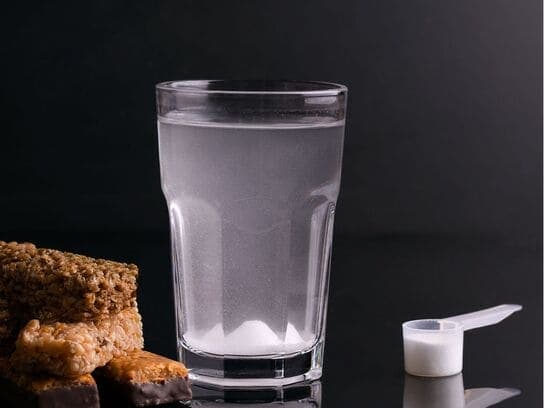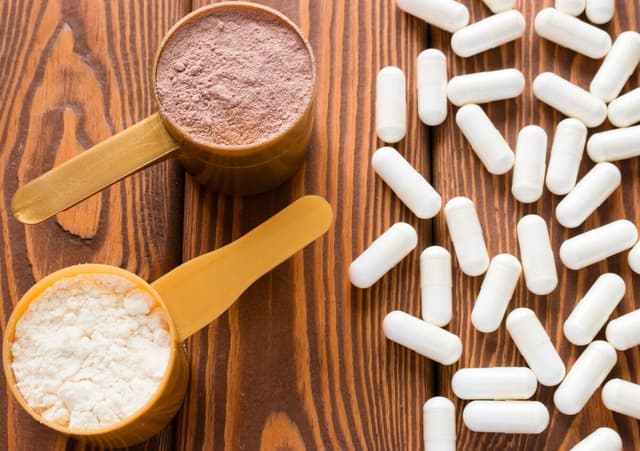Creatine Phosphate: How It Works and Its Role in Muscle Energy

October 3, 2024
When it comes to building muscle and improving athletic performance, the supplement world offers a wide variety of options. Among them, creatine stands out as one of the most researched and effective choices. But how does it work, and why is it so important for energy production in your muscles? In this article, we'll explore the science behind creatine phosphate, its role in muscle energy, and why many consider it the best creatine supplement for maximizing workouts. Whether you're new to supplements or a seasoned gym-goer, understanding how creatine supports your body can help you make informed decisions for your fitness goals.
What Is Creatine Phosphate?
Creatine phosphate, also known as phosphocreatine, plays a crucial role in how your muscles generate energy, particularly during high-intensity, short-duration activities like sprinting or weightlifting. But before diving into the details, let’s first understand what creatine itself is.
Creatine is a naturally occurring compound found in the body, primarily in muscle cells. It’s synthesized from amino acids and stored in muscle tissue as creatine phosphate. When your body needs energy quickly, as in the first few seconds of an intense workout, creatine phosphate comes to the rescue by donating a phosphate group to ADP (adenosine diphosphate), converting it into ATP (adenosine triphosphate)—the primary energy currency of the cell.
This rapid process provides the energy needed to fuel short bursts of activity. Without sufficient creatine phosphate stores, your muscles wouldn’t be able to sustain high-powered movements. So, when people talk about finding the best creatine supplement, they’re often looking for ways to maximize these energy reserves to improve strength, power, and endurance.
The Science of ATP and Energy Production
To really grasp the importance of creatine phosphate, we need to take a closer look at ATP. ATP is the molecule that fuels almost every cellular process in the body, but its stores are limited. Your muscles only have enough ATP to last for about 3 to 5 seconds of intense activity. That’s where creatine phosphate comes in. By replenishing ATP quickly, creatine phosphate allows you to extend your performance in activities like lifting heavy weights or sprinting.
Creatine phosphate acts as a sort of energy buffer, ensuring that ATP levels remain high even during short, high-intensity exercises. This is why many athletes and bodybuilders consider supplementing with the best creatine to be an essential part of their workout regimen. By boosting creatine stores in the muscle, they can increase their ATP production, leading to better performance and faster recovery.
How Creatine Phosphate Boosts Athletic Performance
One of the reasons creatine supplements are so popular is their proven ability to enhance athletic performance, particularly in activities that require quick, explosive bursts of energy. But how exactly does creatine phosphate make this possible?
Increased Strength and Power
Creatine supplementation increases the amount of creatine phosphate stored in your muscles, which in turn allows you to produce more ATP during high-intensity activities. This directly translates into increased strength and power during weightlifting, sprinting, or any other activity that requires short bursts of maximum effort. Studies show that athletes who supplement with creatine can see improvements in their one-rep max, sprint speed, and overall power output.
By choosing the best creatine supplement, you can ensure that you’re maximizing your body’s ability to generate ATP during your workouts. This gives you a competitive edge, allowing you to push harder, lift heavier, and run faster.
Improved Endurance for Short Bursts of Activity
Creatine phosphate doesn’t just help with strength and power; it also improves your ability to sustain high-intensity efforts for slightly longer periods. While creatine phosphate can’t help you run a marathon, it’s invaluable for activities like HIIT (high-intensity interval training), boxing, or team sports that involve repeated sprints.
By replenishing ATP stores quickly, creatine phosphate delays fatigue, allowing you to perform at a high level for longer. This is particularly beneficial for athletes who need to perform in short bursts, as it enables them to maintain their performance across multiple sets, rounds, or intervals.
Enhanced Recovery Between Sets
Another benefit of creatine phosphate is its role in recovery between sets or intervals. By helping to restore ATP levels more quickly, creatine phosphate allows you to recover faster between bouts of exercise. This means you can complete more sets or rounds with less rest, leading to better overall training volume and improved performance over time.
When it comes to selecting the best creatine, look for products that have been specifically formulated to enhance recovery as well as strength and power. Creatine monohydrate, for example, is one of the most researched forms and is highly effective at boosting both performance and recovery.
Types of Creatine and Choosing the Best Creatine Supplement
Now that we understand how creatine phosphate works and its benefits, let’s talk about how to choose the best creatine supplement. With so many options on the market, it can be difficult to know which one is right for you. Here are some of the most common types of creatine supplements and their benefits.
Our Top Recommendations

Optimum Nutrition Micronized Creatine Monohydrate Powder
Micronized for easy mixing, supports muscle growth and endurance.
See on Amazon$0.35 per 5g serving

Nutricost Creatine Monohydrate Micronized Powder
Third-party tested, non-GMO, 5g of pure creatine per serving.
See on Amazon$0.2 per 5g serving

NSF Certified, supports muscle power and recovery.
See on Amazon$0.46 per 5g serving

ProMix Creatine Monohydrate Powder
Micronized, additive-free, ideal for performance and recovery.
See on Amazon$0.36 per 5g serving

NOW Foods Sports Nutrition Unflavored
100% pure creatine, GMP certified, boosts strength and endurance.
See on Amazon$0.2 per 5g serving
Creatine Monohydrate
Creatine monohydrate is by far the most researched and widely used form of creatine. It has been shown to be highly effective in increasing muscle creatine phosphate stores, boosting strength, and improving endurance in high-intensity activities. Creatine monohydrate is also one of the most affordable forms of creatine, making it a popular choice for athletes and gym-goers alike.
If you’re looking for the best creatine supplement, creatine monohydrate is a great place to start. Its proven effectiveness, affordability, and availability make it an excellent choice for anyone looking to boost their performance.
Creatine Hydrochloride
Creatine HCL is another popular form of creatine. It is often marketed as being more soluble and easier to digest than creatine monohydrate, which can reduce the risk of bloating or digestive discomfort. Some studies suggest that you can take a lower dose of creatine HCL while still achieving the same benefits as creatine monohydrate, making it a good option for those who are sensitive to creatine monohydrate.
If you have a sensitive stomach or are looking for a creatine supplement with fewer side effects, creatine HCL might be the best creatine for you.
Creatine Ethyl Ester
Creatine ethyl ester is another form of creatine that is thought to have better absorption rates than creatine monohydrate. However, research on its effectiveness is limited, and some studies suggest that it may not be as effective at increasing muscle creatine phosphate stores as creatine monohydrate. While it may offer some benefits, creatine ethyl ester is generally not considered the best creatine supplement for performance.
Micronized Creatine
Micronized creatine is simply creatine monohydrate that has been processed into smaller particles for improved solubility and absorption. This makes it easier to mix into water or other beverages and may reduce the risk of digestive discomfort. For those who prefer a more easily mixed creatine supplement, micronized creatine could be the best creatine option.
How to Use Creatine Supplements for Maximum Results
Now that you know about the different types of creatine supplements, how do you use them effectively? Here are a few tips to help you get the most out of your creatine supplementation:
- Loading Phase: Many experts recommend starting with a loading phase, where you take 20 grams of creatine per day (split into 4 doses) for 5 to 7 days. This helps to saturate your muscles with creatine phosphate more quickly.
- Maintenance Dose: After the loading phase, switch to a maintenance dose of 3-5 grams per day. This is enough to maintain elevated creatine phosphate levels and ensure you continue to see performance benefits.
- Timing: Creatine can be taken at any time of day, but many people prefer to take it post-workout when your muscles are primed for nutrient absorption. However, consistency is more important than timing, so find a time that works best for you and stick with it.
- Hydration: Creatine draws water into your muscles, so it’s important to stay well-hydrated while taking creatine supplements. Aim for at least 8-10 glasses of water per day to avoid dehydration.
Conclusion: The Best Creatine for Boosting Muscle Energy
Creatine phosphate plays a critical role in muscle energy production, helping to fuel short, intense bursts of activity. By supplementing with creatine, you can increase your muscle creatine phosphate stores, boost ATP production, and enhance your overall strength, power, and endurance. Whether you're a seasoned athlete or just starting out, finding the best creatine supplement can significantly improve your performance and help you reach your fitness goals.
To get started, consider adding creatine monohydrate to your supplement routine—its proven effectiveness and affordability make it the best creatine option for most people. Remember to follow the tips on how to use creatine properly to maximize your results, and enjoy the benefits of improved performance and faster recovery.
Explore our related articles on creatine supplementation for more in-depth information on how to get the most out of your workouts.






